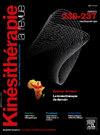从“健康衰老”到老年主义
Q4 Medicine
引用次数: 0
摘要
这篇文章探讨了文学和社会对老年的不同看法,在与失去和依赖有关的消极看法和重视智慧和超然的积极看法之间摇摆不定。它强调,老龄化是一个受社会、经济和个人因素影响的过程。社会对老年的看法是由所使用的术语和所构建的类别(老年人、老年人等)决定的,这些术语和类别往往使人口同质化。老龄化是一项身份认同的工作,每个人都试图保持与过去的连续性,尽管身体和社会发生了变化。长期以来,法国的公共政策一直将老年问题描述为一个社会经济问题,强化了对老年人的消极和同质的看法。然而,从21世纪初开始,出现了“健康长寿”的概念,鼓励积极、健康的老年生活,这往往被视为保持年轻的矛盾命令。这篇文章强调了年龄歧视、普遍存在的、有时制度化的歧视,特别是在医疗保健领域。这影响到老年患者获得护理和照顾的机会,加剧了他们的边缘化。总之,与年龄歧视作斗争需要个人和集体的意识。重要的是要打破刻板印象,把老年看作是一种经历的多样性,而不是不可避免的。这篇文章探讨了文学和社会中对老年的对比看法,在与失去和依赖有关的消极观点和重视智慧和分离的积极观点之间摇摆。它强调了老龄化是一个受社会、经济和个人因素影响的过程。社会对老年人的看法是由所使用的术语和所构建的类别(老年人、老年人等)塑造的,这往往会使这一人口同质化。衰老是一个身份建设的过程,在这个过程中,个人努力保持与过去的连续性,尽管身体和社会发生了变化。英国的公共政策长期以来一直将老年视为一个社会经济问题,强化了对老年人的消极和统一的看法。然而,自2000年以来,“老龄好”的概念出现了,促进积极和健康的老年生活,往往被视为一种矛盾的禁忌,以保持年轻。这篇文章强调了年龄歧视,这是一种广泛的、有时甚至是制度化的歧视形式,特别是在医疗保健方面。它影响到老年患者获得护理和治疗的机会,进一步加剧了他们的边缘化。最后,与年龄歧视作斗争需要个人和集体的意识。我们必须解构刻板印象,把变老看作是一组不同的经历,而不是不可避免的衰退。本文章由计算机程序翻译,如有差异,请以英文原文为准。
Du « Bien vieillir » à l’âgisme
L’article explore les perceptions contrastées de la vieillesse dans la littérature et la société, oscillant entre une vision négative, associée à la perte et à la dépendance, et une vision positive valorisant la sagesse et le détachement. Il souligne que le vieillissement est un processus influencé par des facteurs sociaux, économiques et individuels. La manière dont la société perçoit la vieillesse est façonnée par les termes utilisés et les catégories construites (3e âge, seniors, etc.), qui tendent à homogénéiser cette population. Le vieillissement est un travail identitaire où chacun cherche à maintenir une continuité avec son passé malgré les transformations physiques et sociales. Les politiques publiques françaises ont longtemps présenté la vieillesse comme un problème socio-économique, renforçant une vision négative et homogène des personnes âgées. Toutefois, à partir des années 2000, l’idée du « Bien Vieillir » a émergé, encourageant une vieillesse active et en bonne santé, souvent perçue comme une injonction paradoxale à rester jeune. L’article met en lumière l’âgisme, une discrimination répandue et parfois institutionnalisée, notamment dans le domaine de la santé. Celui-ci affecte l’accès aux soins et la prise en charge des patients âgés, renforçant leur marginalisation. En conclusion, lutter contre l’âgisme nécessite une prise de conscience individuelle et collective. Il est essentiel de déconstruire les stéréotypes et de considérer la vieillesse comme une diversité d’expériences plutôt qu’une fatalité.
The article explores contrasting perceptions of old age in literature and society, oscillating between a negative view associated with loss and dependence and a positive view that values wisdom and detachment. It highlights that aging is a process influenced by social, economic, and individual factors. The way society perceives old age is shaped by the terms used and the categories constructed (third age, seniors, etc.), which tend to homogenize this population. Aging is an identity-building process in which individuals strive to maintain continuity with their past despite physical and social transformations. French public policies have long presented old age as a socio-economic problem, reinforcing a negative and uniform view of the elderly. However, since the 2000s, the concept of “Aging Well” has emerged, promoting an active and healthy old age, often perceived as a paradoxical injunction to remain young. The article highlights ageism, a widespread and sometimes institutionalized form of discrimination, particularly in healthcare. It affects access to care and the treatment of elderly patients, further reinforcing their marginalization. In conclusion, combating ageism requires both individual and collective awareness. It is essential to deconstruct stereotypes and consider aging as a diverse set of experiences rather than an inevitable decline.
求助全文
通过发布文献求助,成功后即可免费获取论文全文。
去求助
来源期刊

Kinesitherapie
Medicine-Rehabilitation
CiteScore
0.40
自引率
0.00%
发文量
135
期刊介绍:
Kinésithérapie, la revue adresse aux praticiens et aux étudiants qui veulent lire des informations accessibles et utiles. Ce est la première revue francophone paramédicale à être indexée dans une base de données internationale - Cumulative Index to Nursing and Allied Health Literature : CINAHL.
 求助内容:
求助内容: 应助结果提醒方式:
应助结果提醒方式:


